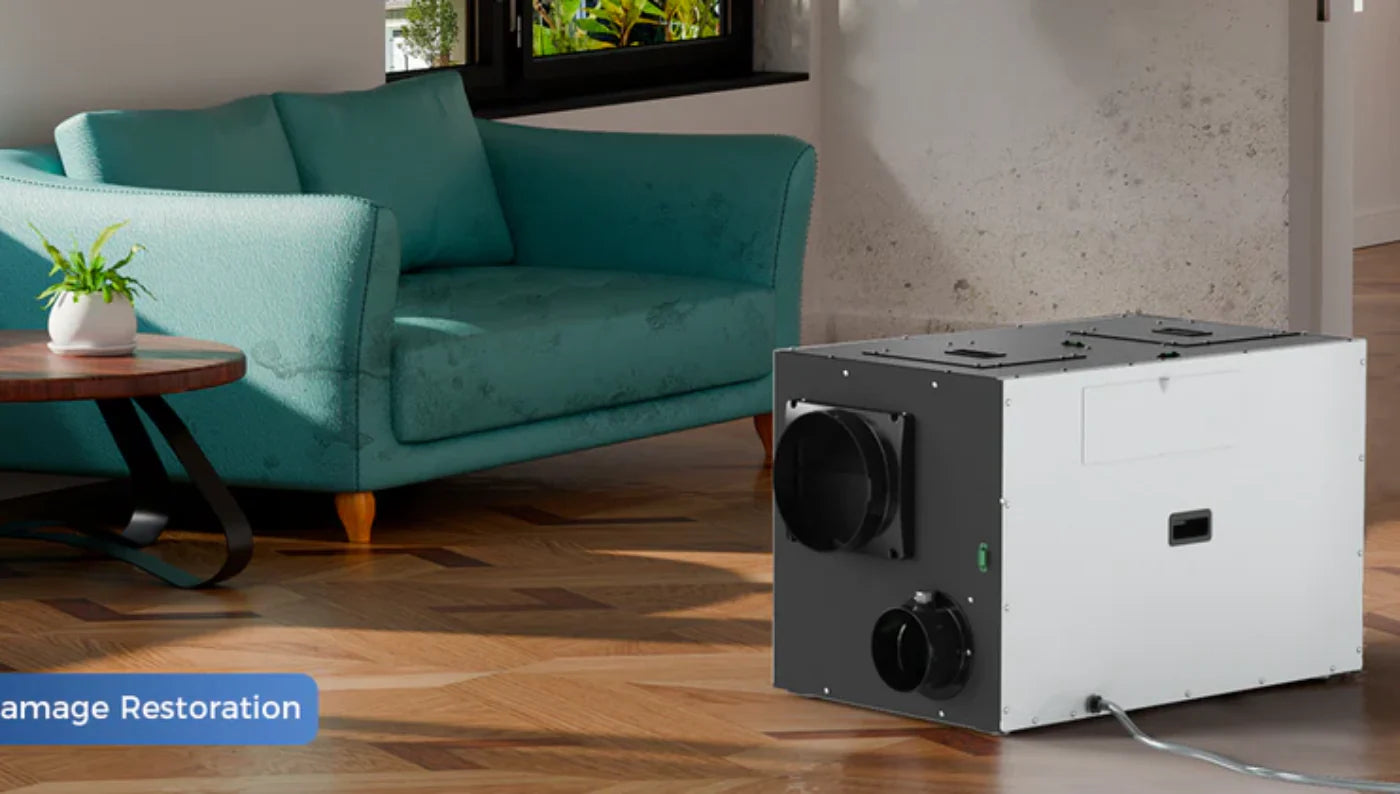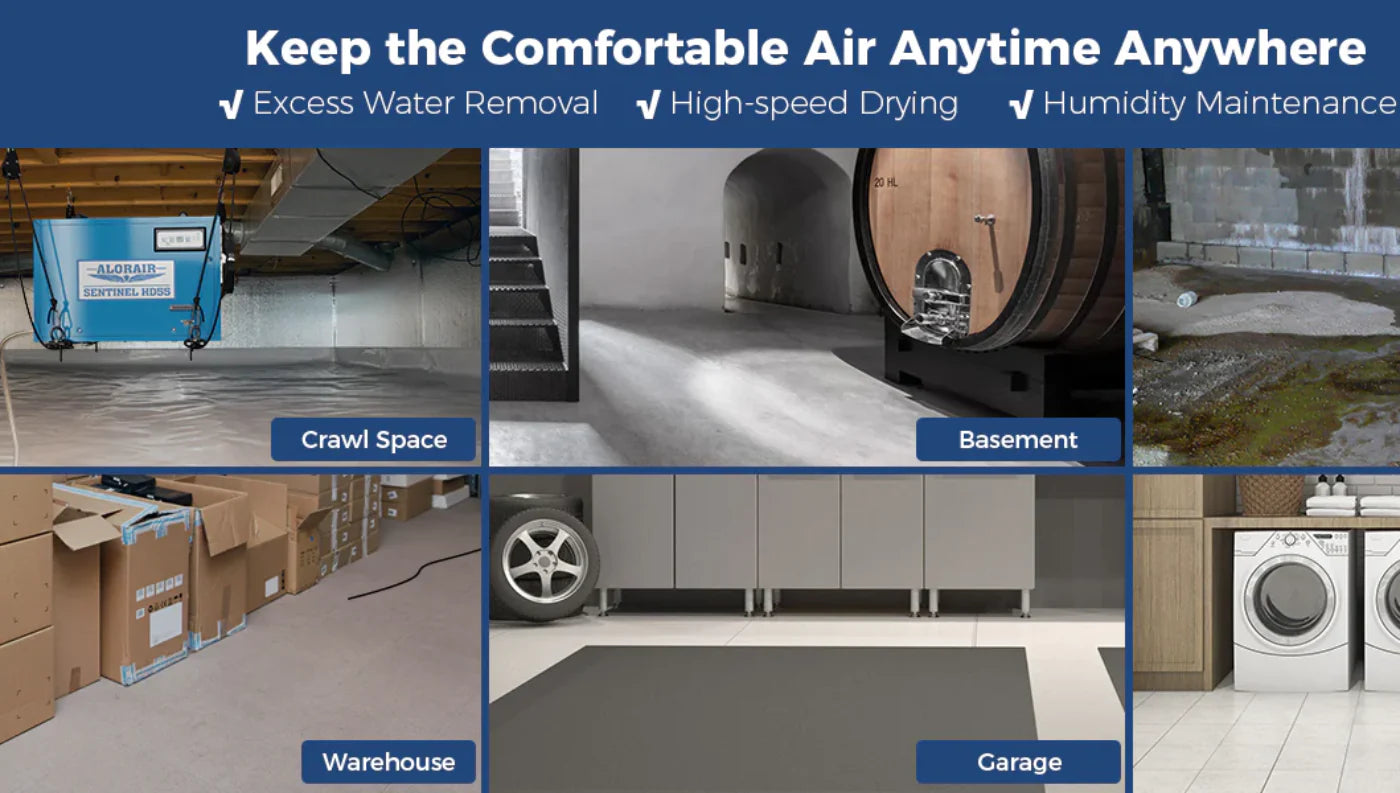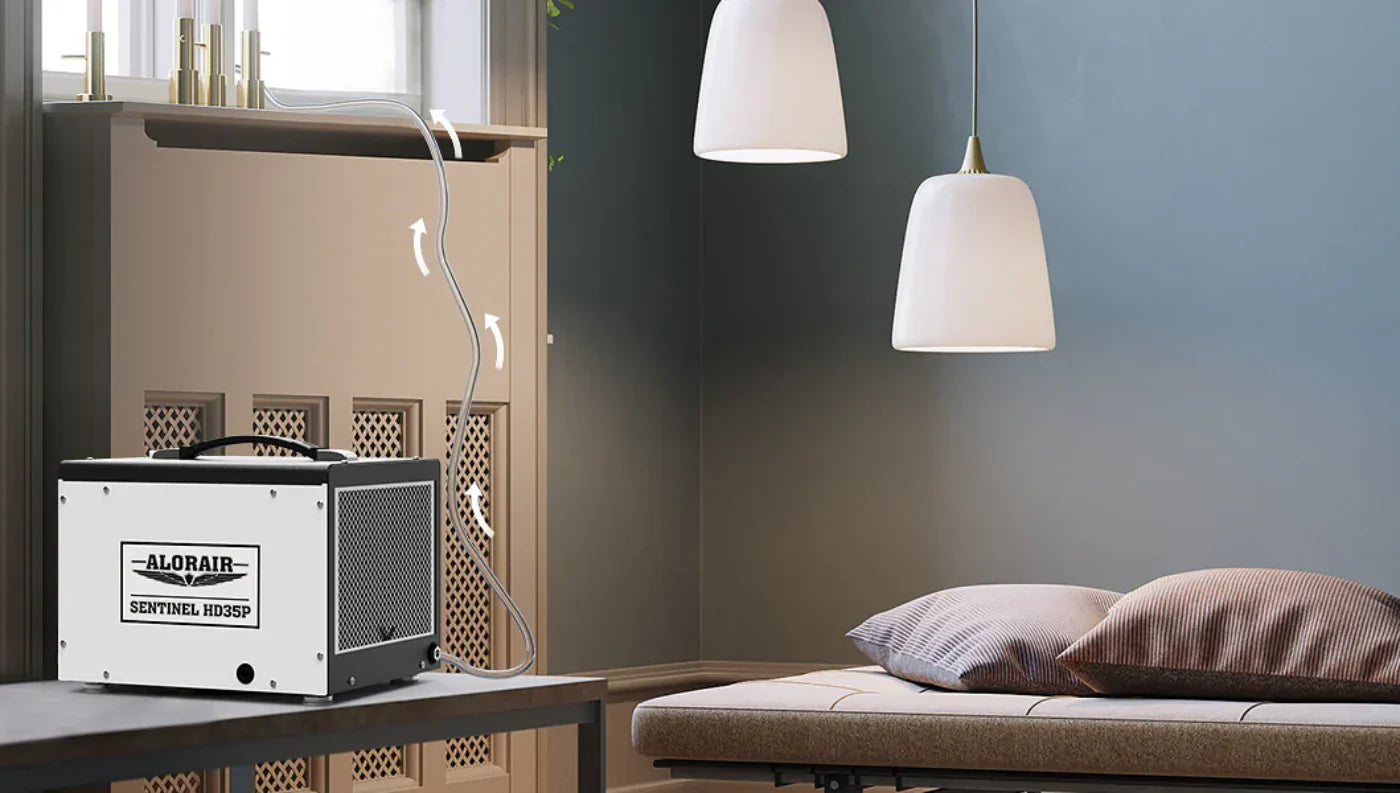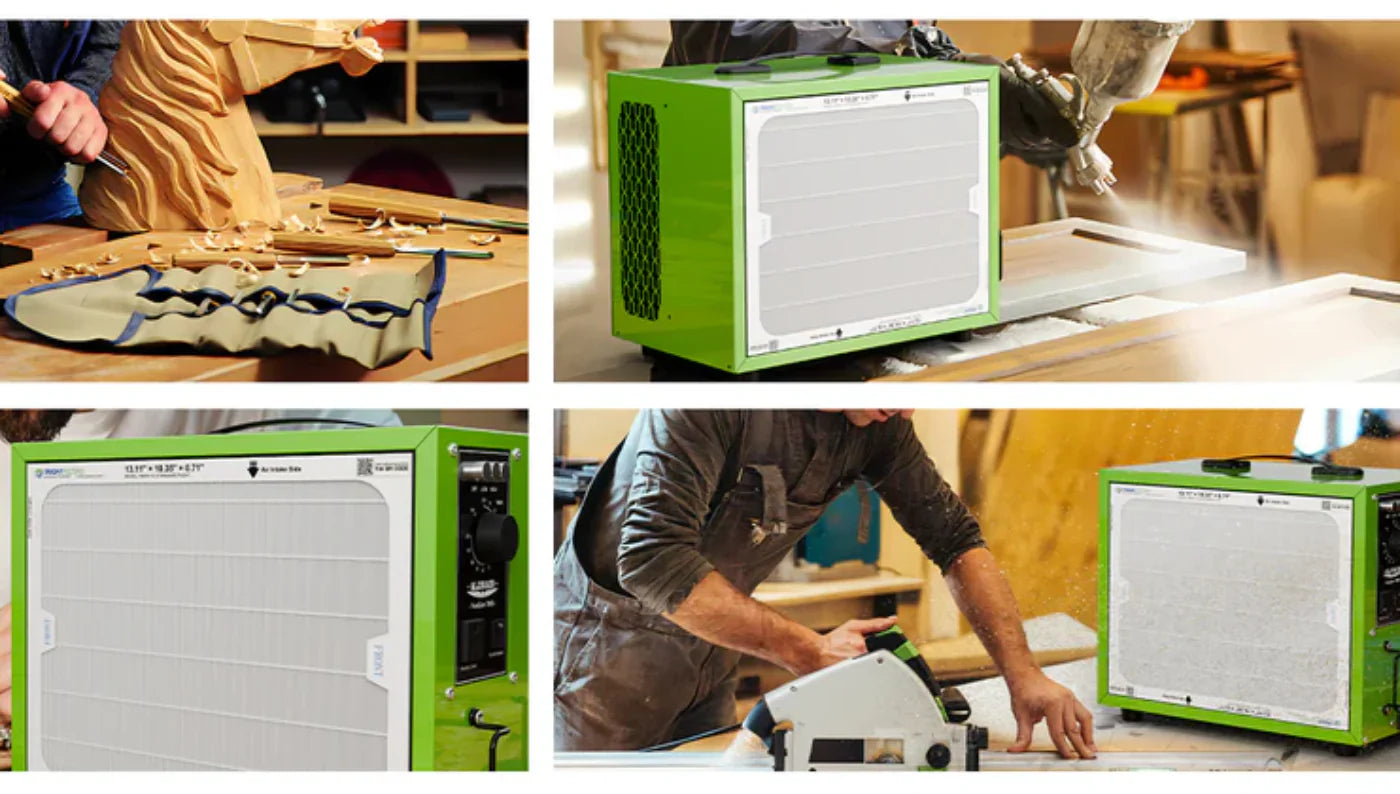Choosing the right dehumidifier for your home isn’t just about picking the biggest unit you can find. It’s about matching the scope of humidity (a basement only vs an entire home), the installation & cost, and the effectiveness of the unit. In this article we’ll compare three setups:
- Portable / single-room dehumidifiers
- Basement (or dedicated space) dehumidifier
- Whole-house dehumidifier integrated with HVAC
We’ll cover when each is appropriate, their advantages/disadvantages, plus a product section with one model example. By the end you’ll better understand: Will a basement dehumidifier help the whole house? and whether you need a whole-home unit or can get by with something smaller.
What’s the difference between the types?
Portable / Single-Room Dehumidifier
These are stand-alone units you plug into an outlet, place in a room (e.g., basement, laundry room, crawl space) and empty a tank (or attach a hose if available). They’re best for localised problems.
Pros
- Lower upfront cost.
- Easy to install since you just plug in.
- Good for tackling specific rooms (e.g., musty basement, utility room).
Cons
- Coverage is limited. According to one source: “Portable dehumidifiers are … too small in capacity and size to efficiently dehumidify larger areas … a portable dehumidifier in the basement will have little effect on the upstairs.”
- Tank-emptying is manual unless you have hose drainage.
- May not reduce humidity throughout the home; air circulation and size matter.
- It may add heat to the space (since dehumidification often releases latent heat) and may make upstairs humidities unaffected.
Basement / Dedicated Space Dehumidifier

This is somewhat in between: a higher-capacity unit located in the basement or dedicated area. It may aim to dehumidify that space and possibly some of the home.
What to consider:
- If that basement is open to the rest of the home and there’s good airflow, the unit might have some benefit upstairs. But many experts caution: “A dehumidifier in a basement … will have little effect on the upstairs.”
-
In some tightly-sealed homes with good circulation from basement to entire house, a well-sized basement unit might cover much of the house. For example: “As long as there is at least some open convective or mechanically driven air flow … a small dehumidifier in the basement … will keep up …” GreenBuildingAdvisor
- But also note: If the basement is closed off or the house has high ventilation/infiltration, the effect upstairs may be minimal.
Pros
- Better capacity than simple portable units.
- Centralised location means one place to service/monitor.
- May reduce costs over multiple portable units.
Cons
- Still may not treat the entire home effectively unless airflow and design are optimal.
- Installation may require decent capacity, drain line, proper placement.
- If upstairs humidity remains high, you may still need additional units or a whole-home solution.
Whole-House Dehumidifier
A whole-house dehumidifier is typically integrated with your HVAC system (or placed in a location that draws return air from the whole home) to condition the entire home’s air rather than just one room or basement. For example, one professional source describes how these units remove moisture from the air stream and send dry air back through your supply ductwork.
Pros
- Comprehensive coverage: treats the entire home’s air volume rather than one space.
- Usually quieter (since many parts are out of living zones) and fewer “tanks to empty”.
- Often more efficient long-term if you truly need whole-home coverage.
- Better for homes with persistent humidity issues throughout living spaces, or where the AC system doesn’t remove enough moisture.
Cons
- Higher upfront cost, both for the unit and installation (ducting, drainage, tie-in).
- More permanent installation (not a plug-in box) and may require professional HVAC work.
- If over-sized for your home, you may pay more without gain; if undersized, you may still have problems.
Will a Basement Dehumidifier Help the Whole House?

That’s the key question for many homeowners, so let’s break it down:
When it can help:
- Your basement is well-connected to the rest of the home via open floor plan, stairwell, central HVAC return/fan, so air circulates between basement and upstairs.
- Your home is tight (low infiltration) so moisture load is manageable and one good unit in basement can handle much of the load. Some evidence supports this in well-sealed homes.
- The basement is the primary source of humidity or the home’s HVAC system already draws a lot of return air from there.
When it won’t be enough:
- If upstairs has separate humidity loads (kitchen, bathrooms, many occupants, lot of cooking/laundry) and the humid upstairs air doesn’t mix well with basement air. (Live Science article: portable basement dehumidifier unlikely to impact upstairs)
- If your home has high infiltration or ventilation bringing in humid outdoor air constantly, overwhelming one unit.
- If the basement is physically isolated (closed off, separated ducting) so the dehumidified air doesn’t flow upward.
- If you need consistent humidity control in multiple floors or zones — you may need either multiple units or whole-home integration.
Conclusion: A basement dehumidifier might help the whole house in the right conditions, but you can’t assume it will. If your home’s humidity problem is isolated to the basement or you just want to protect that space, fine. If you’re seeing dampness throughout the home, a whole-house unit is likely more effective.
How to Decide What’s Right for You

Here are some questions to guide your decision:
- Scope of the problem – Is the high humidity only in basement/crawl space, or is it throughout living spaces upstairs?
- Air circulation – Does your basement share air (via HVAC returns or open stairs) with the rest of your home? Are rooms interconnected?
- Capacity & size – What size is your home (sq ft, zones) and what capacity does the dehumidifier need? Whole-home units have much higher capacity.
- Budget & installation tolerance – A plug-in portable unit is cheaper but may only address one area. A whole-home system costs more but addresses more of your home.
- Long-term goals & comfort – Do you want to rely on minimal maintenance, quiet operation, full-home coverage, or are you okay with monitoring one unit in basement and maybe supplementing later?
- Humidity sources – Basements often accumulate moisture from soil, foundation leaks, poor drainage. If you have these underlying issues, even a whole-home unit won’t fix them unless drainage/encapsulation are addressed. (See that a basement dehumidifier may not fix root cause)
If you determine the humidity issue is living-space wide, not just basement, lean toward a whole-house solution. If the problem is localized and basement is the main culprit, a high-capacity basement unit may suffice — though measure and monitor to ensure coverage.
Whole-House Dehumidifier Model

A typical whole-house dehumidifier designed for integration with HVAC, rated for large homes.
Advantages:
- Covers entire house volume, not just one room.
- Often connects via ducts so the conditioned air is distributed.
-
Less intrusive in living space (may be installed in mechanical room).
Disadvantages: - Higher cost and installation complexity (requires ducting, plumbing/drain, possibly electrical upgrade).
- May be overkill (and unnecessary cost) if your humidity issue is only in a small zone.
- Requires professional installation in many cases.
Frequently Asked Questions
Can one dehumidifier really do the whole house?
Yes, if it’s the right type — a whole-house dehumidifier sized and installed properly, integrated with HVAC or placed to draw air from the entire home. Portable or basement units alone often cannot treat the entire home effectively unless conditions are favourable (good air circulation, low infiltration, manageable moisture load).
If I already have a basement dehumidifier, do I still need a whole-house unit?
Maybe not — if your basement unit keeps humidity under control everywhere, you may not need the more expensive whole-home version. But monitor humidity upstairs, check for persistent dampness in living spaces, and if you see issues, a dedicated whole-house unit may make sense. Also check if the basement unit is large enough and air circulation is good.
H3 – What are typical costs for a whole-house dehumidifier vs portable?
Whole-house units cost more in upfront equipment and installation (ducting, plumbing, professional labour) — one guide says “a whole-house dehumidifier usually costs about half as much as buying a new HVAC system for your home.” PV Heating, Cooling & Plumbing Portable units are much cheaper, typically plug-in, no duct work, but also limited in coverage.
What if upstairs rooms stay humid but basement is fine?
That suggests the dehumidifier or basement unit is not sufficient for the entire home. Possibly air circulation is poor, or upstairs humidity load is large (from cooking, showers, laundry). In that case you’ll want a solution that covers those zones — either additional dehumidifiers or a whole-house system. Monitoring humidity in multiple zones helps determine this.
Does placing a unit in the basement always save energy?
Not automatically. If air circulation is poor or humid air from outside is constantly entering, the unit may run hard. Also, some portable dehumidifiers add heat to the space (and thus cooling load) so the net effect may not always be energy savings. Proper sizing, placement and airflow are key.
Conclusion
If you’re trying to choose between a portable, basement-dedicated dehumidifier and a whole-house unit, the key is matching your actual problem (where is the humidity build-up, how far does it extend) with the right sized solution.
A basement dehumidifier may be all you need if the issue is truly local and airflow allows treated air to reach the rest of your home. But if humidity problems persist across multiple floors or zones, or you want a permanent comprehensive solution, a whole-house dehumidifier is likely the smarter long-term choice.













